Associate Product Managers (APMs) play a key role in the development and success of products. They work closely with various teams to ensure that the product meets the needs of users and aligns with the company's goals.
APM skills include understanding market trends, user experience design, and data analysis, as well as soft skills like communication and teamwork.
Candidates can write these abilities in their resumes, but you can’t verify them without on-the-job Associate Product Manager skill tests.
In this post, we will explore 7 essential Associate Product Manager skills, 10 secondary skills and how to assess them so you can make informed hiring decisions.
Table of contents
7 fundamental Associate Product Manager skills and traits
The best skills for Associate Product Managers include Market Research, Data Analysis, User Experience (UX) Design, Agile Methodology, Roadmap Planning, Stakeholder Management and Technical Understanding.
Let’s dive into the details by examining the 7 essential skills of a Associate Product Manager.
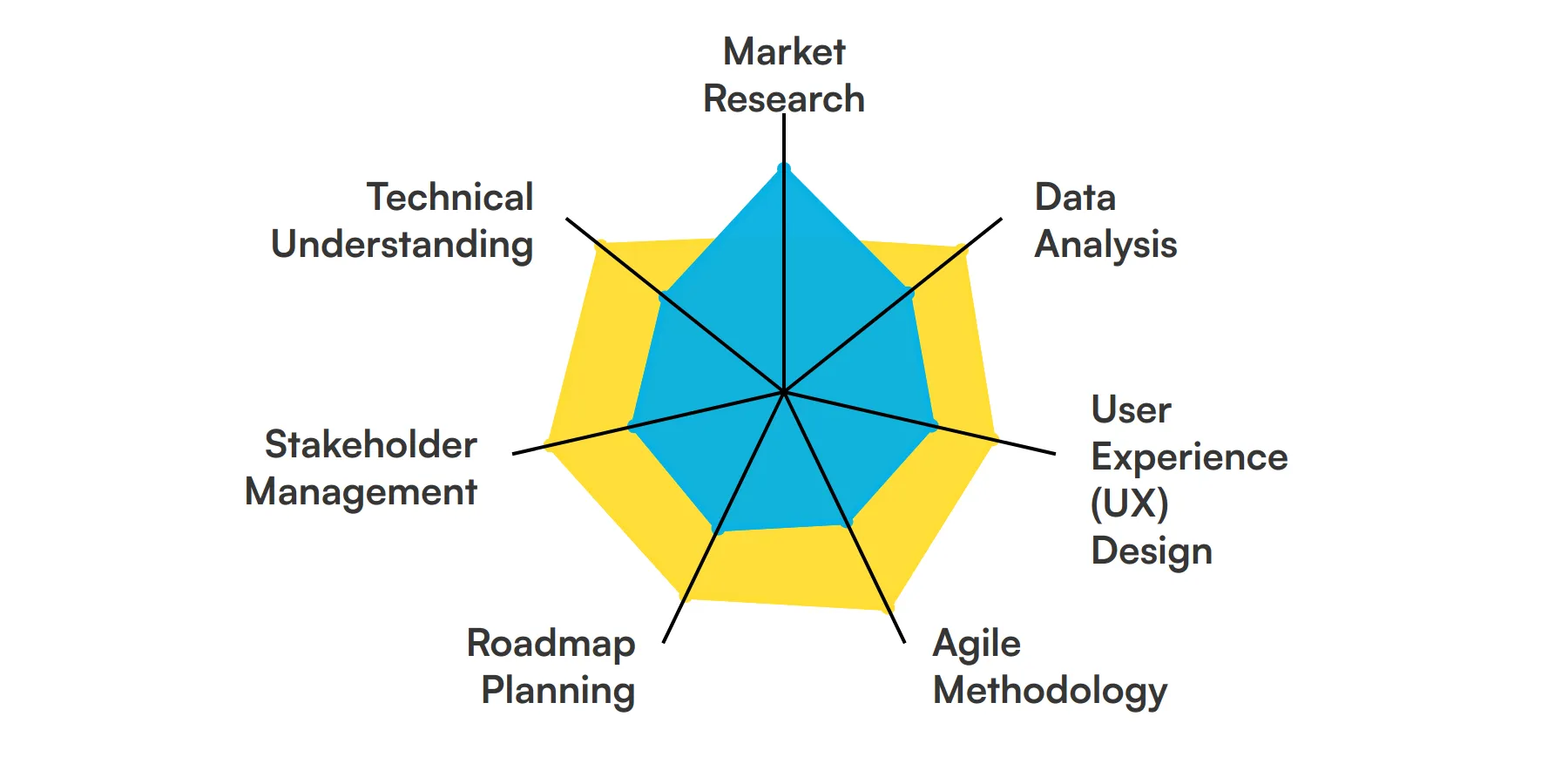
Market Research
Understanding the market landscape is crucial for an Associate Product Manager. This skill involves analyzing market trends, customer needs, and competitor products to make informed decisions. It helps in identifying opportunities and threats, ensuring the product remains competitive.
For more insights, check out our guide to writing a Marketing Analyst Job Description.
Data Analysis
Data analysis is about interpreting data to make data-driven decisions. An Associate Product Manager uses this skill to track product performance, understand user behavior, and measure the success of product features. It helps in making informed decisions and optimizing the product.
User Experience (UX) Design
UX design focuses on creating products that provide meaningful and relevant experiences to users. An Associate Product Manager needs to understand user needs and pain points to ensure the product is user-friendly and meets customer expectations.
Agile Methodology
Agile methodology involves iterative development and collaboration. An Associate Product Manager uses this approach to manage product development efficiently, ensuring quick iterations and continuous improvement based on user feedback.
Check out our guide for a comprehensive list of interview questions.
Roadmap Planning
Roadmap planning is about outlining the vision, direction, and progress of a product over time. An Associate Product Manager uses this skill to communicate the product strategy and ensure alignment with business goals.
Stakeholder Management
Managing relationships with stakeholders is key for an Associate Product Manager. This skill involves communicating effectively with different teams, understanding their needs, and ensuring their alignment with the product vision.
For more insights, check out our guide to writing a Project Manager Job Description.
Technical Understanding
Having a basic technical understanding helps an Associate Product Manager communicate effectively with the development team. It involves knowing the technical constraints and possibilities, which aids in making informed decisions about product features.
10 secondary Associate Product Manager skills and traits
The best skills for Associate Product Managers include A/B Testing, Wireframing, Competitive Analysis, Customer Feedback, Prototyping, Project Management, User Interviews, Documentation, Usability Testing and Feature Prioritization.
Let’s dive into the details by examining the 10 secondary skills of a Associate Product Manager.
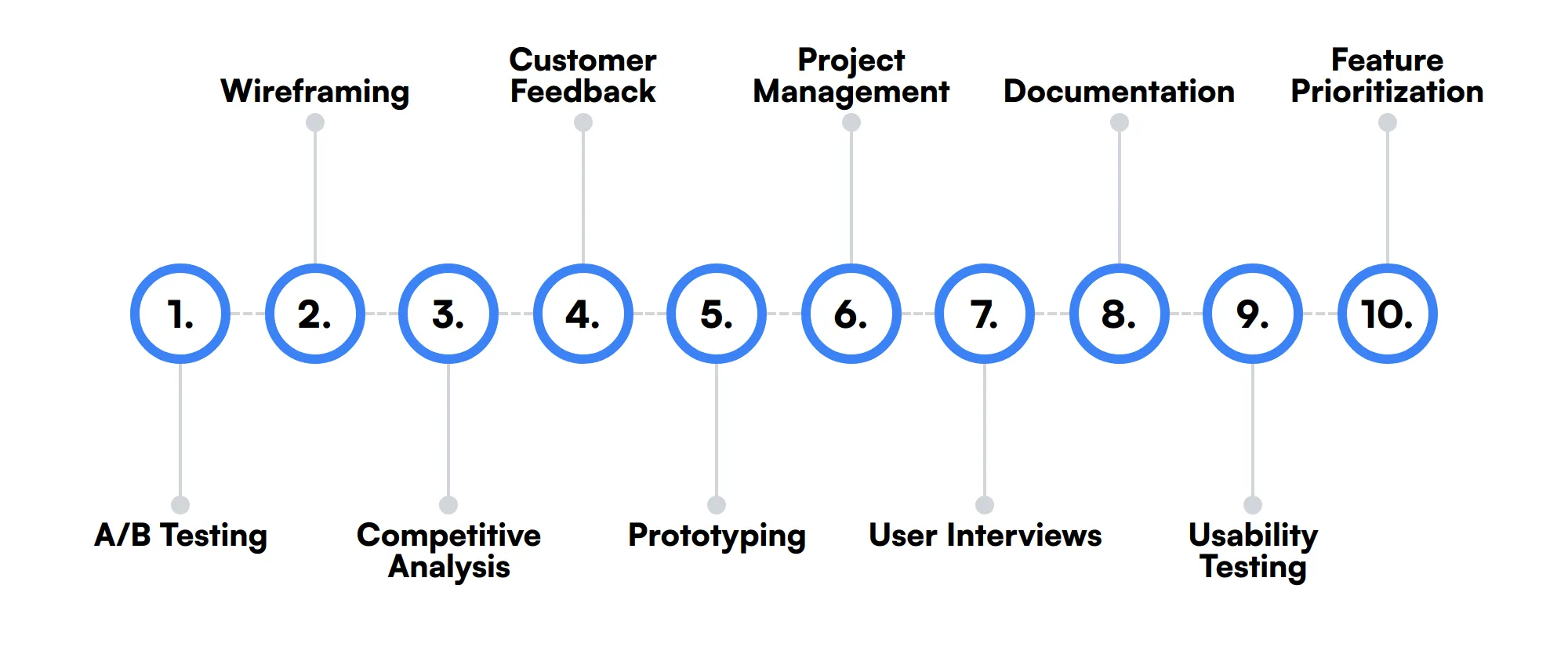
A/B Testing
A/B testing involves comparing two versions of a product to determine which one performs better. This skill helps in optimizing product features and improving user experience based on real data.
Wireframing
Wireframing is the process of creating a visual guide that represents the skeletal framework of a product. It helps in planning the layout and functionality of a product before development begins.
Competitive Analysis
Competitive analysis involves evaluating competitors' products to understand their strengths and weaknesses. This skill helps an Associate Product Manager identify opportunities for differentiation and improvement.
Customer Feedback
Collecting and analyzing customer feedback is essential for understanding user needs and improving the product. This skill helps in making user-centric decisions and enhancing customer satisfaction.
Prototyping
Prototyping involves creating an early model of a product to test and validate ideas. This skill helps in identifying potential issues and gathering feedback before full-scale development.
Project Management
Project management involves planning, executing, and closing projects. This skill helps an Associate Product Manager ensure that product development stays on track and meets deadlines.
User Interviews
Conducting user interviews helps in gathering qualitative data about user needs and behaviors. This skill aids in understanding the user perspective and making informed product decisions.
Documentation
Creating clear and concise documentation is important for communicating product requirements and updates. This skill ensures that all stakeholders are on the same page and that the development process runs smoothly.
Usability Testing
Usability testing involves evaluating a product by testing it with real users. This skill helps in identifying usability issues and improving the overall user experience.
Feature Prioritization
Feature prioritization is about deciding which product features to develop first based on their impact and feasibility. This skill helps in ensuring that the most valuable features are delivered to users promptly.
How to assess Associate Product Manager skills and traits
Assessing the skills and traits of an Associate Product Manager (APM) can be a nuanced process. It's not just about what they know, but how they apply that knowledge in real-world scenarios. From market research to data analysis, and from user experience (UX) design to agile methodology, each skill plays a significant role in their day-to-day responsibilities.
Traditional resumes and interviews often fall short in providing a comprehensive view of a candidate's capabilities. This is where skills-based assessments come into play. By leveraging tools like Adaface assessments, you can gain a clearer understanding of an APM's proficiency in key areas such as roadmap planning, stakeholder management, and technical understanding. These assessments can lead to a 2x improved quality of hires and an 85% reduction in screening time.
Let’s look at how to assess Associate Product Manager skills with these 6 talent assessments.
Market Research Test
Our Market Research Test evaluates a candidate's proficiency in market research techniques, data analysis, and market analysis, which are key for understanding market trends and customer needs.
The test assesses their ability to perform data interpretation and quantitative analysis, crucial for making informed business decisions.
Candidates who score well demonstrate strong capabilities in business intelligence and marketing aptitude, essential for strategic planning and market positioning.

Data Analysis Test
Our Data Analysis Test assesses a candidate's skills in handling and interpreting data, using tools like SQL and Excel, to extract actionable insights.
This test challenges candidates to analyze data scenarios, detect anomalies, and use statistical methods to project outcomes.
High-scoring individuals show proficiency in data operations and investigations, indicating their ability to support business analysis with accurate data insights.

UI/UX Design Test
The UI/UX Design Test focuses on evaluating a candidate's design thinking and application of UI/UX principles in creating user-centric designs.
It tests knowledge in areas such as wire-framing, prototyping, and user research, essential for effective interface design.
Successful candidates will demonstrate a strong understanding of visual and interaction design principles, crucial for crafting intuitive and engaging user experiences.
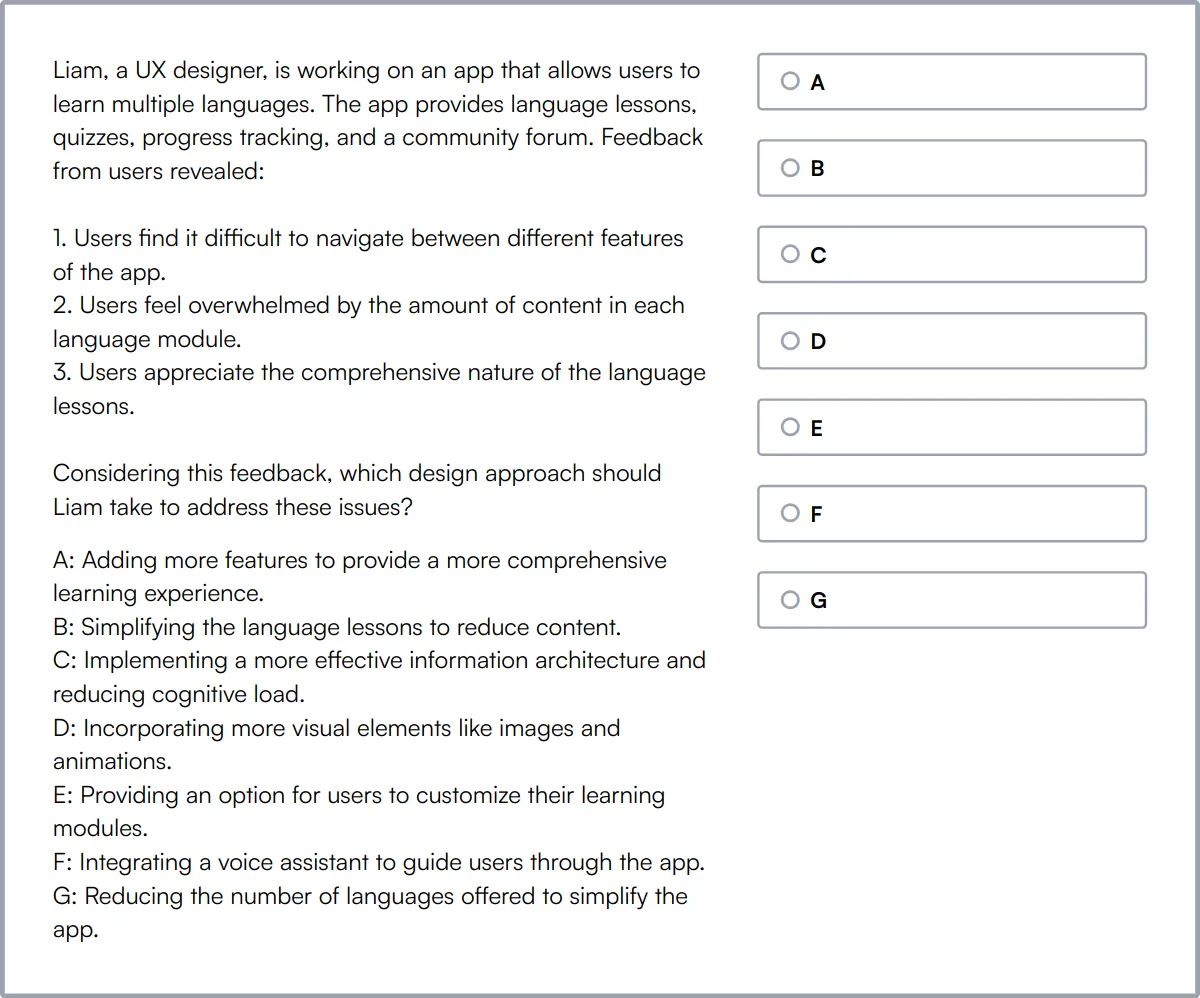
Scrum Master Test
Our Scrum Master Test evaluates a candidate's understanding of the Scrum framework and agile principles, important for managing development projects efficiently.
The test covers key areas such as sprint planning, user stories, and Scrum roles, assessing the candidate's ability to facilitate agile events and processes.
Candidates who excel in this test are well-versed in Scrum artifacts and can effectively guide teams through iterative development cycles.
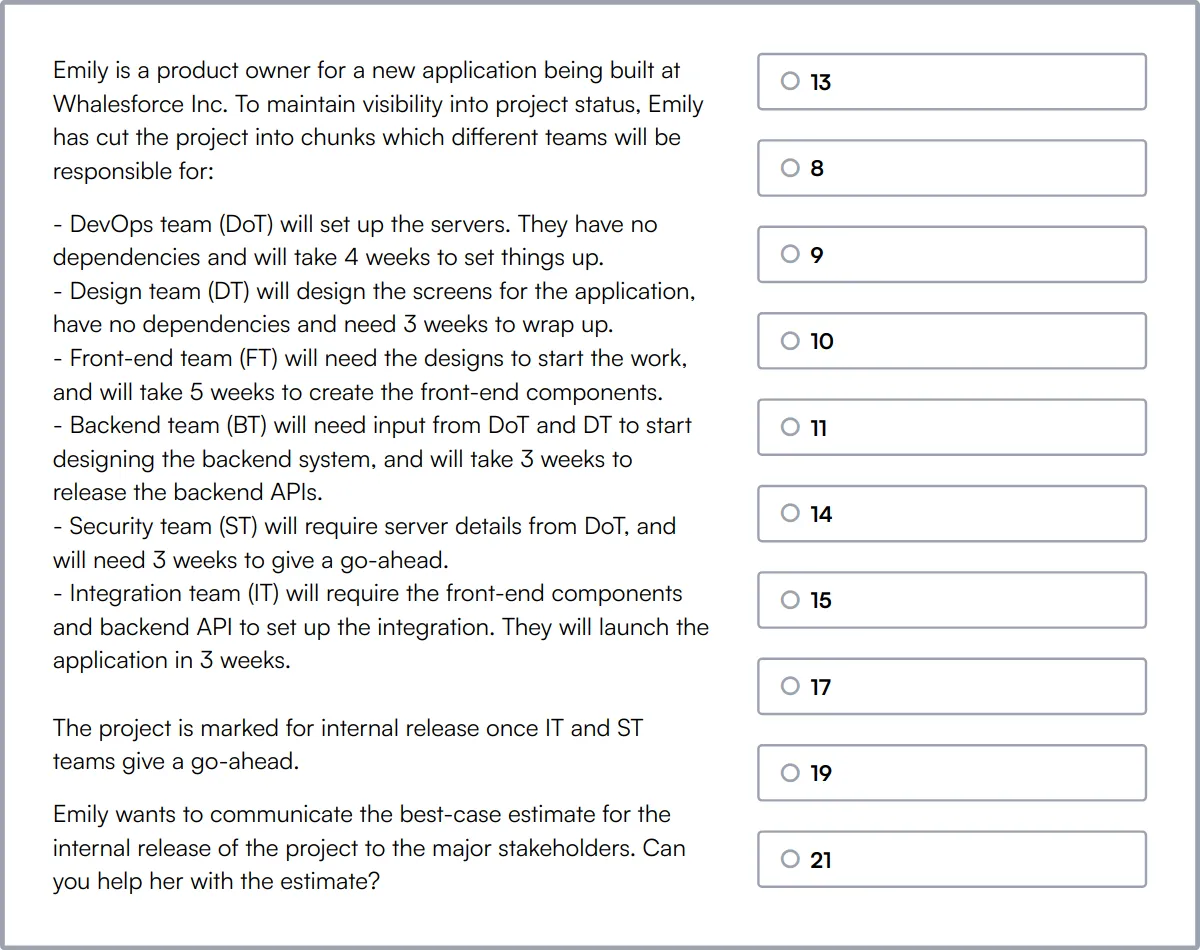
AI Product Manager Test
The AI Product Manager Test is designed to assess a candidate's ability to manage AI-driven products, focusing on AI fundamentals and data modeling.
This test evaluates skills in storytelling, project management, and communication, necessary for articulating product visions and collaborating with technical teams.
High performers are adept at integrating AI with business strategies, ensuring that AI applications are aligned with company goals and customer needs.
Product Owner Test
Our Product Owner Test assesses a candidate's expertise in agile methodologies and product management practices, crucial for leading product development teams.
The test evaluates the candidate's ability to manage product backlogs, define product visions, and prioritize features, which are key for successful product lifecycle management.
Successful candidates demonstrate strong skills in stakeholder management and strategic roadmapping, enabling them to effectively guide products from conception to market.
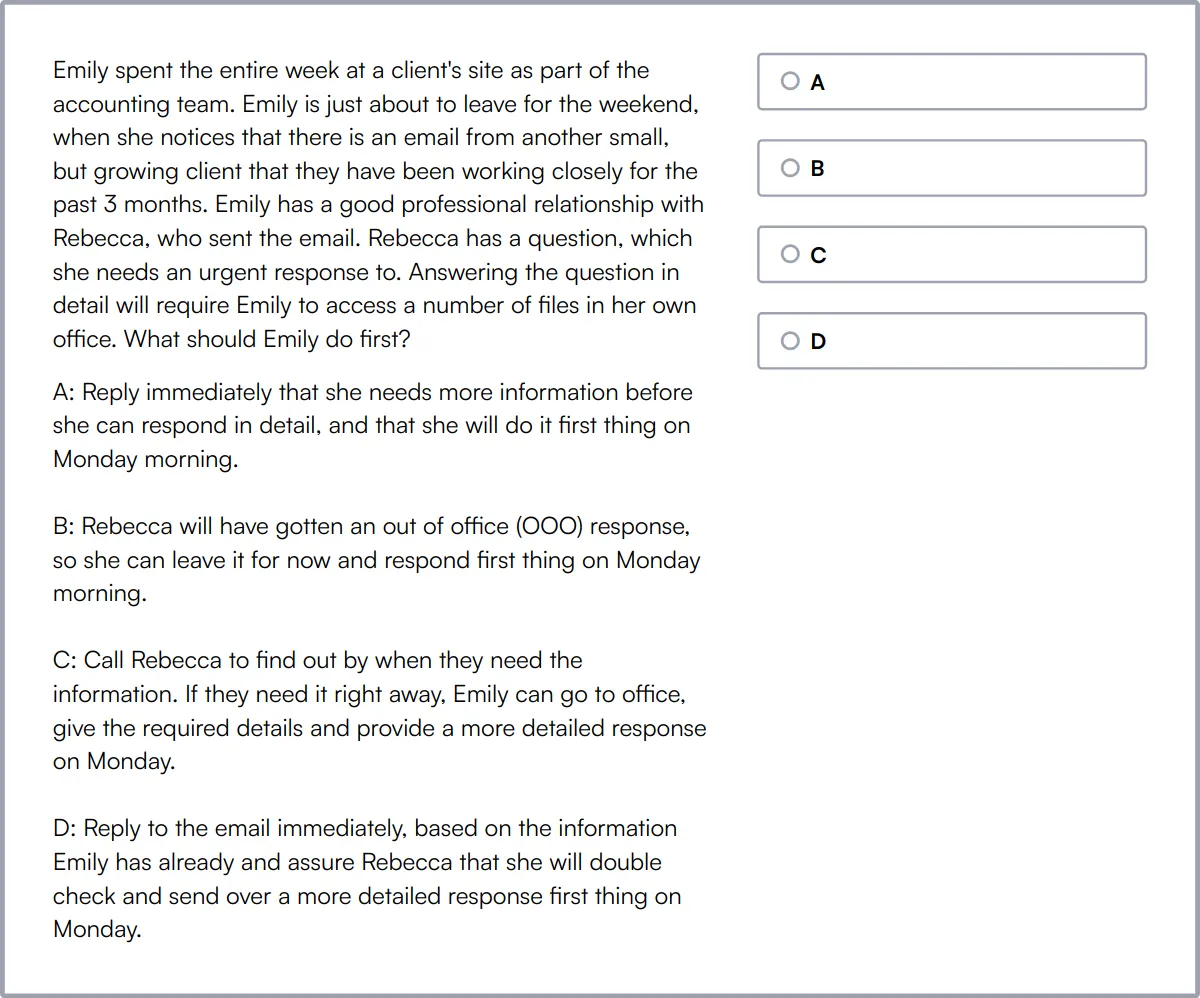
Summary: The 7 key Associate Product Manager skills and how to test for them
| Associate Product Manager skill | How to assess them |
|---|---|
| 1. Market Research | Evaluate ability to gather and interpret market data. |
| 2. Data Analysis | Assess skills in analyzing and deriving insights from data. |
| 3. User Experience (UX) Design | Check proficiency in creating user-friendly designs. |
| 4. Agile Methodology | Determine understanding and application of Agile principles. |
| 5. Roadmap Planning | Gauge capability in planning and prioritizing product features. |
| 6. Stakeholder Management | Assess effectiveness in communicating with and managing stakeholders. |
| 7. Technical Understanding | Evaluate knowledge of technical concepts and product architecture. |
Product Manager Online Test
Associate Product Manager skills FAQs
What skills should an Associate Product Manager possess for effective market research?
An Associate Product Manager should be skilled in identifying target markets, understanding customer needs, and analyzing market trends. Proficiency in tools like surveys, focus groups, and analytics platforms is beneficial.
How can you assess an Associate Product Manager's capability in data analysis?
Evaluate their ability to interpret data sets, generate insights, and make data-driven decisions. Familiarity with tools like Excel, SQL, or specialized analytics software is a plus. Consider setting a practical test using real data scenarios.
What is the importance of UX design skills for an Associate Product Manager?
UX design skills help in creating products that are not only functional but also user-friendly. Assessing these skills involves reviewing past project designs, understanding user-centric design principles, and evaluating problem-solving capabilities.
How does knowledge of Agile methodology benefit an Associate Product Manager?
Agile methodology allows for flexible product development, enabling quick adaptations based on feedback. Assess this skill by discussing their experience with Agile practices and how they've managed iterative project cycles.
What techniques can be used to evaluate an Associate Product Manager's skills in stakeholder management?
Look for their ability to communicate effectively, negotiate, and manage expectations. Role-playing scenarios or behavioral interview questions can reveal how they handle conflict and maintain productive relationships.
How important is technical understanding for an Associate Product Manager, and how can it be assessed?
Technical understanding aids in communicating with development teams and making informed product decisions. Assess this by discussing their technical background, understanding of software development processes, and familiarity with the technologies used in your projects.
What role does customer feedback play in the responsibilities of an Associate Product Manager?
Customer feedback is key to refining products and aligning them with user needs. Assess a candidate's skills by exploring how they gather, analyze, and act on feedback to drive product improvements.
How can you test an Associate Product Manager's proficiency in feature prioritization?
Feature prioritization is critical for focusing resources on high-impact product enhancements. Evaluate this skill by discussing how they have previously prioritized features and the rationale behind their decisions.
Assess and hire the best Associate Product Managers with Adaface
Assessing and finding the best Associate Product Manager is quick and easy when you use talent assessments. You can check out our product tour, sign up for our free plan to see talent assessments in action or view the demo here:

40 min skill tests.
No trick questions.
Accurate shortlisting.
We make it easy for you to find the best candidates in your pipeline with a 40 min skills test.
Try for freeRelated posts
Free resources



